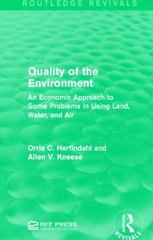You are currently a worker earning $60,000 per year but are considering becoming an entrepreneur. You will not switch unless you earn an accounting profit
You are currently a worker earning $60,000 per year but are considering becoming an entrepreneur. You will not switch unless you earn an accounting profit that is on average at least as great as your current salary. You look into opening a small grocery store. Suppose that the store has annual costs of $150,000 for labor, $40,000 for rent, and $30,000 for equipment. There is a one-half probability that revenues will be $200,000 and a one-half probability that revenues will be $400,000.
a. In the low-revenue situation, what will your accounting profit or loss be? In the high-revenue situation?
b. On average, how much do you expect your revenue to be? Your accounting profit? Your economic profit? Will you quit your job and try your hand at being an entrepreneur?
c. Suppose the government imposes a 25 percent tax on accounting profits. This tax is only levied if a firm is earning positive accounting profits. What will your after-tax accounting profit be in the low-revenue case? In the high-revenue case? What will your average after-tax accounting profit be? What about your average after-tax economic profit? Will you now want to quit your job and try your hand at being an entrepreneur?
d. Other things equal, does the imposition of the 25 per-cent profit tax increase or decrease the supply of entrepreneurship in the economy?
Step by Step Solution
There are 3 Steps involved in it
Step: 1

See step-by-step solutions with expert insights and AI powered tools for academic success
Step: 2

Step: 3

Ace Your Homework with AI
Get the answers you need in no time with our AI-driven, step-by-step assistance
Get Started


